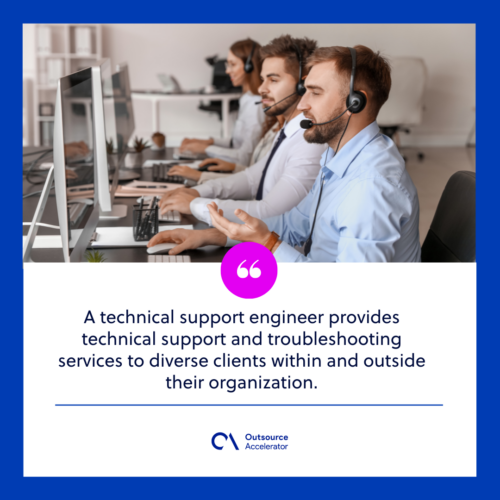Technical support engineer: Definition, skills, and responsibilities

In today’s rapid-paced technological landscape, a technical support engineer’s function has become increasingly important.
With the constant evolution of software, hardware, and virtual services, agencies rely upon professional experts to provide assistance and troubleshoot technical issues.
This article will shed light on the definition, skills, and responsibilities that define the function of a technical support engineer.
What is a technical support engineer?
A technical support engineer provides technical support and troubleshooting services to diverse clients within and outside their organization.
Technical support engineers resolve network problems, configure operating systems, and provide remote assistance through remote desktop connections.
To quickly address fundamental IT issues, email and chat applications are used to respond promptly to clients.

Educational requirements of a technical support engineer
Technical support engineers need specific educational requirements. The field of technical support engineering frequently places a strong emphasis on realistic capabilities and hands-on experience. A formal degree in computer science or a related area can be advantageous.
Let’s discover the academic pathways and qualifications of a successful technical support engineer:
Degree programs
Many technical support engineers have finished a bachelor’s degree in computer science, computer engineering, or a related discipline.
Certifications
Further to a degree, obtaining relevant certifications can strengthen a technical support engineers’ credentials.
Certifications validate their abilities and knowledge in particular technology areas, making them extra marketable to potential employers.
Practical experience and hands-on projects
At the same time as formal training and certifications lay the foundation, practical experience is highly valued in technical support engineering.
Employers often seek applicants with hands-on experience in troubleshooting technical issues and supplying help to end-users.
Essential skills of a technical support engineer
A technical support engineer requires both technical and soft skills:
Technical skills
A technical support engineer must have strong technical ability and expertise to fix and resolve client problems quickly.
These experts deeply understand a product’s technology solutions, which specific businesses produce.
Knowledge of operating systems
Tech support engineers must understand different operating systems like Windows, Mac OS, and Linux. They should know how to diagnose and resolve operating system issues while guiding customers.

Networking skills
Networking skills are critical for a technical support engineer. They resolve network problems, configure operating systems, and provide remote assistance through remote desktop connections.
Further, they must understand network protocols like TCP/IP, DNS, and DHCP.
Knowledge of programming languages
Technical support engineers must know about Java, C++, Python, and Ruby to polish software issues and give guidance to clients.
Troubleshooting skills
A technical support engineer needs excellent troubleshooting skills to provide practical solutions to customers and must quickly diagnose and resolve technical issues.
Hardware knowledge
To fix hardware issues and provide technical guidance, a technical support engineer must understand CPUs, motherboards, RAM, and hard drives.
Security knowledge
A good understanding of security protocols such as firewalls, antivirus, and malware protection is essential for this profession.
Soft skills
In terms of skills, a technical support engineer must possess the following:
Communication skills
Communication skills are critical for technical support engineers as they interact with customers daily.
They should be able to communicate technical information clearly and concisely and adapt their communication style to suit the customer’s level of technical knowledge.
Customer service skills
A technical support engineer should have excellent customer service skills to ensure customer satisfaction.
Listening to customer inquiries patiently, offering timely solutions, and conducting follow-ups to ensure their issues are resolved should be essential skills for them.
Time management skills
Technical support engineers know how to manage their time effectively to provide prompt customer solutions.
Documentation skills
A technical support engineer should have excellent documentation skills to record customer interactions, issues, and resolutions.
They must know to create technical documents such as user manuals, troubleshooting guides, and FAQs.
Roles and responsibilities of a technical support engineer
In general, a technical support engineer is responsible for the following:
Providing technical assistance
Technical support engineers provide technical assistance to customers via phone, email, chat, or person. They explain complex technical concepts in simple terms so customers understand and will know what to do.
Troubleshooting technical issues
These specialists diagnose and troubleshoot technical issues customers encounter while using technology products and services. They know the ins and outs of the product or service they support.
Documenting and tracking issues
As a technical support engineer, it is essential to document and effectively track technical issues reported by customers.
It involves using sophisticated tools such as a help desk ticketing system to resolve customer issues within the agreed-upon service level agreement (SLA).
Escalating issues
Knowing when to escalate technical issues is crucial for technical support engineers. They must clearly understand when a problem requires the attention of higher-level support teams, such as engineering or development teams.
This ensures that the customer receives the best possible resolution.
Continuous learning
Technical support engineers must stay up-to-date with the current trends and continuously improve their skills and knowledge. They usually participate in training sessions, attend conferences and workshops, and read technical manuals and publications.
Providing customer feedback
Giving feedback to other departments is crucial. The feedback needs to be based totally on the problems from the client’s report to help enhance the products or services and avoid similar problems in the future.

Outsourcing technical support engineer
Outsourcing technical support engineers has become a common practice for organizations looking to streamline their operations and reduce expenses.
By entrusting their technical support needs to outside specialists, companies can focus on core business activities while ensuring efficient and dependable customer support.
Outsourcing gives firms access to a pool of seasoned technical support engineers with specialized skills and extensive experience.
These specialists are appropriately versed in dealing with various technical issues and can provide efficient and robust solutions. Businesses can gain from their knowledge without investing in colossal training or hiring additional personnel.







 Independent
Independent




